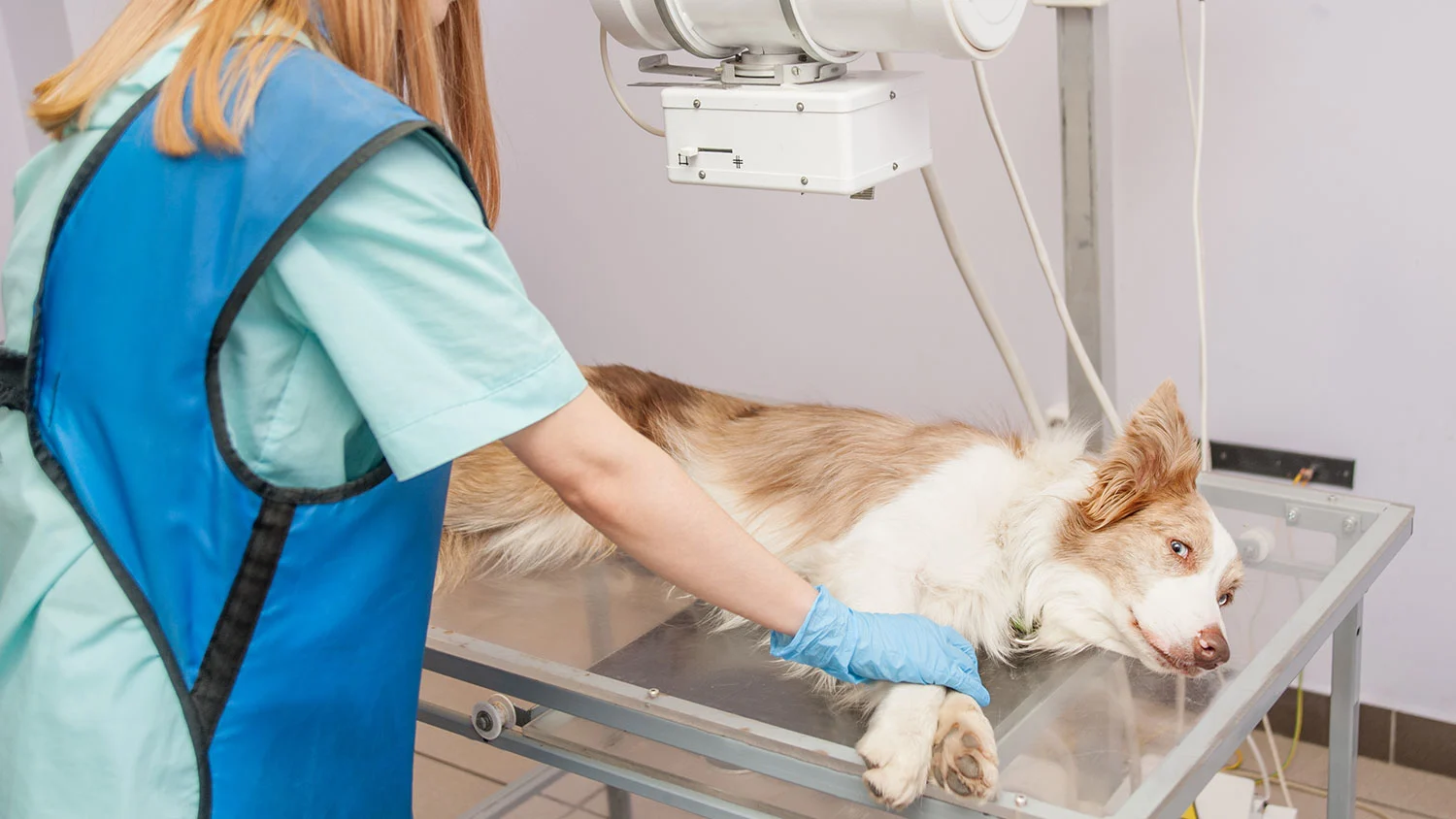Veterinary Specialists
Your vet may refer you to a specialist if a health issue requires more specific attention. Doing your research is important, so we broke down some FAQs for you!

For many pet owners, veterinary specialists are a mystery and many pet owners don’t even know they exist! However, these professionals can play a critical role in getting your dog back to feeling his best. Understanding why your dog may need to see a specialist and the difference between specialty fields can help you make informed decisions about the best course of care of your dog.
What is a veterinary specialist?
A veterinary specialist is a veterinarian who focuses on a particular field of veterinary medicine. To become a specialist, a veterinarian often must do a residency at a veterinary university where they undergo extensive training beyond four years of veterinary school. Depending on the area of study, a residency can range two to three years. In order to become board-certified in their field, the veterinarian must pass a national exam.
Why go to a specialist?
Your veterinarian may refer you to a specialist if your pet has an unresolved or worsening medical condition despite treatment, a need for around-the-clock medical supervision, or a difficult case that requires more expert consideration. In the case of an emergency, you may decide to take your dog to a specialty 24-hour emergency clinic so that your pup can receive immediate care.
Can I afford a specialist?
Visiting a specialty clinic can often cost more than a visit to your regular veterinarian—however, it is usually well worth the extra cost! In general, visiting a specialist means your pet requires advanced medical care using state-of-the-art diagnostics. Investing in pet insurance when your pup is young can help you make the decision of whether or not you can afford to visit a specialist. Pet insurance can help pay for costly emergency or specialist exam fees and advanced diagnostics and treatment.
Internal Medicine
Internists are often the first line of defense in more complex cases. If an underlying disease is unknown or has not yet been diagnosed, your primary care veterinarian may refer you to an internist to do preliminary diagnostics until the underlying cause is revealed. Sometimes the internist will then refer you to another specialty. Many conditions are treated by the internist themselves. Internists treat diabetes, thyroid conditions, other endocrine disorders, chronic infections, and organ diseases.
Criticalist/Emergency Care Specialist
These specialists usually work at emergency clinics, often 24-hour clinics, and provide immediate care, monitoring and life support for pets that become injured or develop an acute life threatening disease. Critical care and emergency specialists graduate veterinary school and then continue on for a minimum of three additional years of emergency, surgery, and critical care training. Patients of emergency specialists include animals showing signs of trauma, shock, or difficulty breathing and pets with life-threatening neurologic diseases.
Cardiologists
Specializing in the heart and circulatory system, cardiologists work with conditions such as congestive heart failure, heart muscle diseases, and congenital heart defects. Cardiologists use diagnostic tools such as echocardiography (ultrasound image of the heart), electrocardiography (electrical readings of the heart’s rhythm), and radiography to diagnose conditions. Breeders may also work with cardiologist to perform cardiac health tests on their breeding stock.
Neurologists
Neurologists focus on diseases of the brain, spinal cord, and other parts of the nervous system. Unlike human neurologists, most veterinary neurologists can both diagnose a condition and perform the necessary surgery to address the disease. Most commonly, neurologists use MRIs, CT scans and spinal taps to diagnose their patients.
Oncologists
Concentrating on the diagnosis and treatment of tumors and cancers, oncologists are trained to balance treatment of cancer with managing symptoms and side effects of the treatment method to keep the pet comfortable. There two types of oncologists—medical oncologists and radiation oncologists. Though both specialize in cancer, a medical oncologist specializes in treating cancer with chemotherapy and a radiation therapist specializes in treating cancer with radiation therapy. Often times, a radiation oncologist and medical oncologist will work together to provide the most comprehensive treatment for your pet.
Dermatologists
Veterinary dermatologists specialize in diseases and conditions of the skin. They are often trained in both internal medicine and immunology as skin diseases can occur as a result of an underlying internal disease. Dermatologists help with many conditions such as allergies, atopic dermatitis, alopecia (hair loss) and skin cancer.
Ophthalmologist
Ophthalmologists diagnose and treat diseases and conditions related to the eye. Patients with cataracts, glaucoma, retinal disease, cancer of the eye, or a severe injury to the eye are often referred to an ophthalmologist for treatment. Breeders wanting to make informed breeding decisions often consult with ophthalmologists to conduct health testing to choose the best dam and sire to produce a litter.
Surgeons
Veterinary surgeons undergo additional training to perform advanced surgical procedures. Orthopedic surgeons focus on bones, joints, ligaments, and tendons. Soft tissue surgeons specialize in internal organs, mass removal, and non-bone tissue.
Radiologist
Radiologists specialize in performing and interpreting X-rays, ultrasounds, CT scans, MRI’s, and other specialty imaging. A radiologist serves as a consultant to your pet’s treating veterinarian to assist in the diagnosis of your pet’s condition.
Dentists
Much like humans, your dog may need to visit a dentist! Veterinarians can choose to specialize in dentistry and focus their attention on treating medical conditions associated with your pet’s mouth. Oral and dental diseases are prevalent in companion animals, with periodontal (gum) disease being the most common. Veterinary dental specialists handle everything from plaque and tartar control to removal of oral tumors to complex tooth extractions.Preventative care can go a long way in reducing the amount of time and money spent with a veterinary dentist.
Anesthesiologists
Anesthesiologists focus on the use of a variety of anesthetics to properly sedate your pet during surgical procedures. These specialists are trained to recognize and anticipate concerns while your pet is under anesthesia. Some patients are at a higher risk when using anesthesia due to size, age, or their physical condition, so having a skilled anesthesiologist present will help to reduce the chance of problems occurring. These specialists monitor breathing, heart function, and blood pressure throughout your pet’s surgery and recovery.
Behaviorists
Veterinarians who choose additional training in the field of veterinary behavioral medicine are skilled in understanding the relationship between an animal’s behavior relating to his health, experiences, and environment. Behaviorists can determine if there is a medical component that needs to be treated or if a problem stems from learned association, a conflict over social structure, or a neurochemical imbalance. If your dog suffers from a behavioral condition such as separation anxiety or compulsive behaviors, your veterinarian may suggest behavioral therapy.
The Right Specialist
Your primary care veterinarian will advise you on the right specialist to go to for your pet’s condition or symptoms. Currently, there are 22 American Veterinary Medical Association recognized veterinary specialty organizations made up of 41 specialties. If your veterinarian refers you to a specialist or an emergency requires you to rush into the nearest 24-hour emergency clinic, know that your pet is in expert hands!

Every Dog and Cat Deserves the Pet Insurance of Champions
Get prize-winning care for your pets.

Mary comes to AKC Pet Insurance with an extensive background in animal care. As a lifelong animal lover, she has a passion for promoting pet health and wellness. Mary lives in Kentucky with her orange kitty, "Cat" and her dog, " Wubbi".
READ MORE ARTICLES

